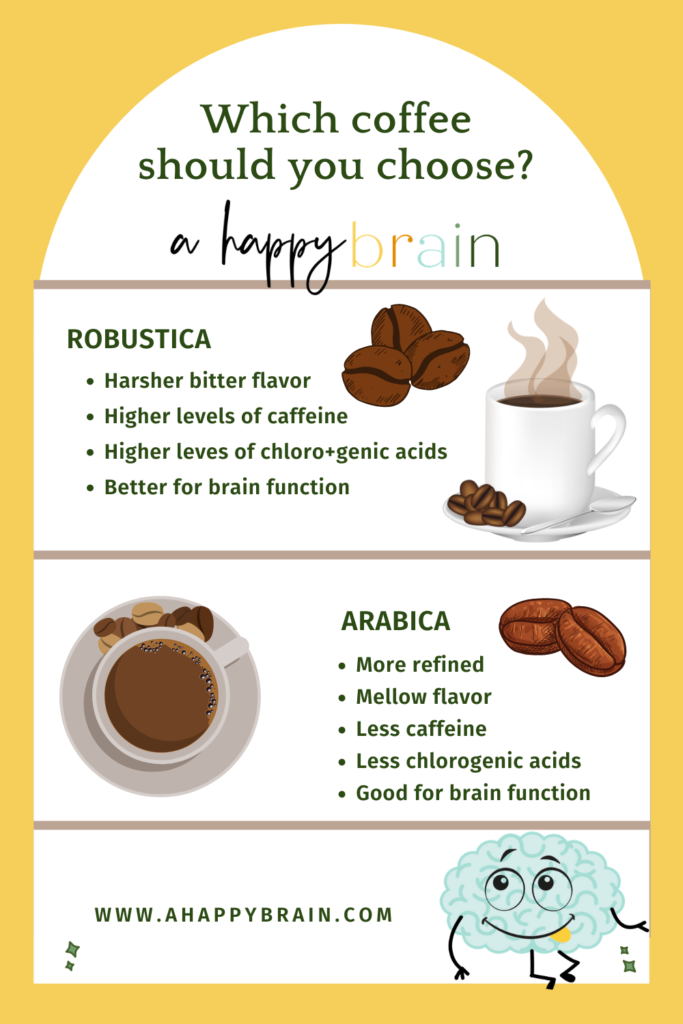Have you every thought about coffee and brain health? Maybe you’ve wondered if drinking coffee can improve your memory? Find answers to these questions and more in this post.
Here at AHappyBrain Headquarters, it sometimes feels like we’re running on coffee and blind optimism! And you won’t be surprised to hear that coffee helps more than half of US adults through their day. So, here at the office, we thought it was about time to explore this delicious beverage and learn a little more about it, specifically its effects on our brain health.
A Brief History of Coffee
For the last 600 years or so, humans have been roasting and brewing coffee beans to prepare a mildly stimulant drink. In its early days, people considered considered coffee a miraculous energy booster. This brown brew helped worshippers to stay awake all night during religious observances. It gave scholars the focus to concentrate more vigorously on their studies.
Coffee and Religion
Surprisingly, coffee was banned at various times in history by religious organizations. These organizations disapproved of its stimulant effect. Clearly even back then there were those who overdid it and got so caffeinated they couldn’t focus on their Bibles! However, at the turn of the 17th century, the head man himself, Pope Clement VIII, gave coffee his official blessing. Soon Europe buzzed with packed coffee houses.
Around this time, coffee began to be lauded in England for its medicinal qualities. People believed it to be a great cure for nervous disorders and stomach complaints. In fact, some even recommended it as an early version of viagra! Coffee drinkers also praised the beverage for its effect on mental ability. In fact, coffee shops were known as “penny universities”1. This name came from the cost of coffee at the time. For a penny one could buy a cup of coffee and at the same time boost your intelligence and wit! These early coffee houses became great hubs of intelligent (and sober!) conversation and debate. In fact, many even ended up as the headquarters of social revolutions.
Coffee and Brain Health
But, is there any truth to the claim that coffee is good for the brain? It’s well known that coffee is full of antioxidants2 which are excellent for your overall health. Coffee drinkers also live longer3, on average, than those who abstain. However coffee can also have downsides. For example, it has addictive qualities, and can cause negative side-effects such as increased anxiety, insomnia and higher blood pressure. In this article I’ll try to get to the bottom of whether coffee is really good for the brain, and if so, why…

A Wake-up Call to the Brain
Firstly, let’s look at the immediate effects of the active ingredient in your cup of coffee—caffeine. Caffeine’s stimulant effects are what most people are looking for when they drink coffee, as well of course, as the delicious flavor.
Caffeine blocks adenosine. Adenosine is a neurotransmitter which makes you feel sleepy. It builds up over the course of the day and slows down your neural activity, leading to increased “sleep pressure”—the reason you are ready for bed by nighttime. Caffeine stops adenosine from binding to receptors in your brain, thus stimulating your nervous system and making you feel wide awake4. Your neurons fire faster, making you more alert, as we’ve all experienced after a cup of coffee.
Coffee and Brain Health: The Link Between Coffee and Alzheimer’s Disease
Much has been published about the relation of coffee to the prevalence of Alzheimer’s and dementia in older age. The overall verdict is that yes, drinking coffee throughout your life has a protective effect against these conditions5. Researchers found that the lowest occurrence of dementia and Alzheimer’s was in those who drank 3-5 cups of coffee each day in mid-life. But what exactly is it in coffee that protects against these conditions?
The caffeine itself is the most obvious answer. As we mentioned above, caffeine modulates adenosine. This not only makes you sleepy, it also has an inflammatory effect on the brain6, in particular the hippocampus, which is where our memories are formed. By reducing the effect of adenosine, caffeine may protect the brain, and your memory, against the damage caused by this inflammation.
However, coffee contains other important ingredients. Chlorogenic acid is found in high concentrations in coffee. Research shows that this component may have neuroprotective qualities7. In fact, chlorogenic acid may also be beneficial to cognitive function8.
Researchers have also looked at trigonolline, another component in coffee. They found that this factor boasts neuroprotective qualities9. Trigonelline is a bitter alkaloid found in coffee, as well as oats, fenugreek and some other foods. Studies have shown that trigonelline has great potential for use as an “anti-Alzheimer’s agent”10.
Coffee and Brain Health: The Link Between Coffee and Parkinson’s Disease
In addition to decreasing the risk of Alzheimer’s disease, coffee may also impact the risk of Parkinson’s disease.
Researchers have observed that coffee drinkers show a lesser incidence of Parkinson’s11. They believe that it is the caffeine which is making the difference. So far, however, there is no conclusive reason for why coffee drinkers tend to suffer less from Parkinson’s12.
Is Coffee Good for your Memory?
A team of scientists at John Hopkins University made a fascinating discovery in 201413. They found that caffeine not only has cognitive-enhancing effects, it also helps you to make stronger memories. In fact, it might even help retain memories longer.
In this study, researchers analysed two groups. They asked both groups to study a collection of images. After both groups studied the images, researchers gave one group caffeine tablets. The other group served as the control group. The following day, researchers slightly changed some of the images and left others the same. They then asked both groups to study the images again. They found that the caffeinated group was much better at noticing the subtle differences in the image. This skill is known as ”pattern separation”. Pattern separation, according to the scientists, demonstrates a much deeper type of memory retention. These findings suggest that caffeine enhances memory consolidation in the long term.
Robusta or Arabica – Which is Better for the Brain?
So far we’ve talked about how coffee may be helpful to the brain, but what type works best?
Something I’d never really thought about before I started the research for this article is the difference between the two main types of coffee that we drink—Arabica and Robusta. I never really considered which might be better for me, so I did some background reading.
Arabica beans are grown at higher altitudes, and have a smoother, sweeter taste. Many consider this type of coffee to be superior to Robusta, which has a harsher, more bitter flavor. But what I wanted to know was whether Robusta or Arabica was better for your brain health.
It turns out that those bitter flavor notes that are present in Robusta coffee may provide additional benefits. This bitterness is due to higher levels of our old friends—caffeine and chlorogenic acids14. As we’ve seen above, both of those have beneficial effects to our brain function. It seems that the answer is clear. Despite the less refined flavor, Robusta has the edge over Arabica when it comes to looking after your gray matter.

Other Thoughts about Coffee and Brain Health
How you take your coffee is another question. For now, keep an eye on your sugar consumption, it’s not doing your brain any favors, as I discussed in another post.
Also, be sure to enjoy this brain boosting beverage early in the day. Drinking coffee in the afternoon and evening may mess with your ability sleep. Missing out on sleep will likely negate any benefits of your coffee elixir. And with that last nugget of advice, I think it’s time for a nice cup of coffee! See you very soon!
Dr. Annissa Slusher
References
- https://www.historic-uk.com/CultureUK/English-Coffeehouses-Penny-Universities/
- https://www.ncbi.nlm.nih.gov/pmc/articles/PMC4665516/
- https://jamanetwork.com/journals/jamainternalmedicine/article-abstract/2686145
- https://pubmed.ncbi.nlm.nih.gov/1356551/
- https://pubmed.ncbi.nlm.nih.gov/19158424/
- https://www.ncbi.nlm.nih.gov/pmc/articles/PMC2228262/
- https://www.ncbi.nlm.nih.gov/pmc/articles/PMC5543670/
- https://www.ncbi.nlm.nih.gov/pmc/articles/PMC6213760/
- https://pubmed.ncbi.nlm.nih.gov/22680628/
- https://pubmed.ncbi.nlm.nih.gov/24374010/
- https://www.nature.com/articles/1602788
- https://www.medicalnewstoday.com/articles/drinking-coffee-may-protect-some-people-against-parkinsons
- https://www.nature.com/articles/nn.3623
- https://link.springer.com/article/10.1007/s00217-016-2643-y

